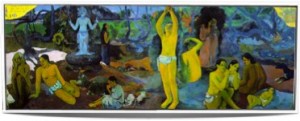How did we then, as Christians, so lose our vision of what it meant to be human, he asked, that humanist intellectuals rejected Christianity as being too stifling? We had lost our vision of what it mean to reflect God’s image on earth, he lamented, to be salt and light to the world.
The French artist Paul Gauguin had posed the basic life questions on what he had thought would be his last canvas before attempting suicide, explained Gerard. He then projected the painting with the long title, Where Do We Come From? What Are We? Where Are We Going?, on the screen up front in the English Reformed Church. The answers to these questions would describe what it mean to be human, he added.
Our challenge–and opportunity–as we faced the coming twenty years, suggested Gerard, was to flesh out an answer to this question: what did it mean to be human?
God was humanic! declared the preacher-poet. That meant he was mad about humanity, and valued every human: Muslim, Christian, whatever belief. Our calling as the church was to reflect God’s heart for humanity.
Gerard began his address on ‘speaking hope into the human future’ with the statement, Hope was the bridge between the past and the future. Yet post-modernity had a problem with a history usually written by the rich and powerful: it was not reliable. So we didn’t know who we were because we didn’t really know our past, and didn’t know where we were going.
The Christian story was all about what it meant to be human. God had chosen humanity to help shape the future with him. We needed to return to this calling to show what humans were for.
Hope was the unity that rendered our diversity beautiful. Diversity was not an option for today’s generation, said Gerard. They had grown up with it. If our faith was captive to a particular colour and culture, our children would reject it as being too narrow.
Why was the world diverse? asked Gerard. God made it that way! So why did our children’s discovery of his diversity so threaten us? The gospel was a universal story. Our faith was meta-national. How could our faith be trapped in one culture when our God was free of culture?
Could we show this universality, this diversity, in our churches? Might we actually be the one group in Europe who could demonstrate this diversity, Gerard challenged his audience.
He and other speakers at the symposium can be viewed on ywam.eu/symposium, with the exception of Christine Schirrmacher. For security reasons, her talk on Europe and Islam was not recorded. Dr Schirrmacher, one of Europe’s leading Islamologists, brought a much-needed balance to the debate on Islam’s role in Europe.
We Christians had missed many chances to make friends and help Muslims integrate in Europe, where many of them have been living now for 40 years. If we had more Muslim friends we would not be so vulnerable to the stereotypes depicted in panic literature. The integration debate only made sense if we could define what values Europe stood for, she said. Here was a further challenge and opportunity facing us in the coming twenty years.
Stefan, my son, delivered a lively and entertaining presentation on how the internet will continue to pervade our lives in the coming years. ‘Scared yet?’ he asked at one stage. Don’t be, he continued. People were once scared of travelling at above 40 kph. What we needed, he concluded, was wisdom and understanding, an intergenerational task.
Michael Schluter, who had spent most of the day fog-bound in London, arrived just in time to share his vision of a biblical alternative to capitalism. Something was seriously wrong with our European societies, he began. We had a financial crisis, a family crisis and a culture crisis, among others. Dealing with symptoms was not enough, he warned. We needed to see the world through a relational lens. Capitalism’s moral flaws were rooted in their neglect of the Relationship factor–the heart of being human.
Till next week,
Jeff Fountain
Till next week,

